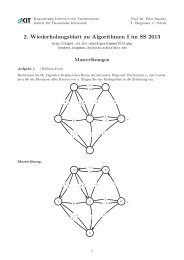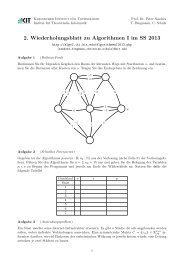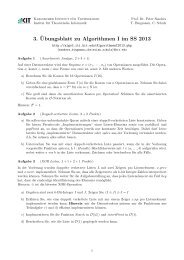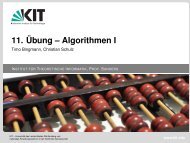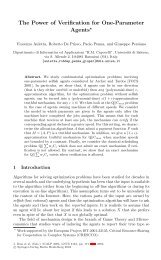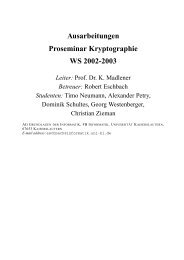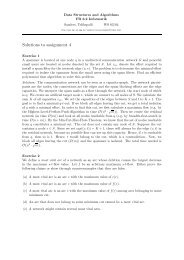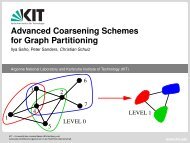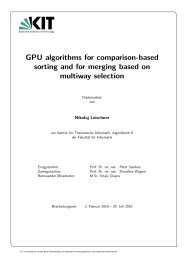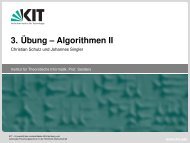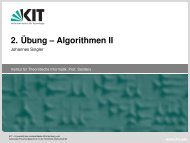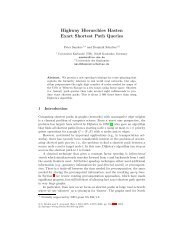Stxxl : Standard Template Library for XXL Data Sets - Max-Planck ...
Stxxl : Standard Template Library for XXL Data Sets - Max-Planck ...
Stxxl : Standard Template Library for XXL Data Sets - Max-Planck ...
You also want an ePaper? Increase the reach of your titles
YUMPU automatically turns print PDFs into web optimized ePapers that Google loves.
to reduce this gap. They offer frameworks which aim to speed up the process of implementing<br />
I/O-efficient algorithms, abstracting away the details of how I/O is per<strong>for</strong>med.<br />
TPIE and LEDA-SM projects are excellent proofs of concept of external memory paradigm,<br />
but have some drawbacks which impede their practical usage. This led us to start the development<br />
of a per<strong>for</strong>mance–oriented library of external memory algorithms and data structures <strong>Stxxl</strong>,<br />
which tries to avoid those obstacles. The following are some key features of <strong>Stxxl</strong>:<br />
• Transparent support of parallel disks. The library provides implementations of basic parallel<br />
disk algorithms. <strong>Stxxl</strong> is the only external memory algorithm library supporting parallel<br />
disks. Such a feature was announced <strong>for</strong> TPIE in [35, 22].<br />
• The library is able to handle problems of very large size (up to dozens of terabytes).<br />
• Improved utilization of computer resources. <strong>Stxxl</strong> supports explicitly overlapping between<br />
I/O and computation. <strong>Stxxl</strong> implementations of external memory algorithms and data<br />
structures benefit from overlapping of I/O and computation.<br />
• Small constant factors in I/O volume. A unique library feature “pipelining” can save more<br />
than half the number of I/Os per<strong>for</strong>med by many algorithms.<br />
• Shorter development times due to well known STL-compatible interfaces <strong>for</strong> external memory<br />
algorithms and data structures. STL – <strong>Standard</strong> <strong>Template</strong> <strong>Library</strong> [34] is the library of<br />
algorithms and data structures which is a part of the C++ standard. STL algorithms can<br />
be directly applied to <strong>Stxxl</strong> containers (code reuse); moreover the I/O complexity of the<br />
algorithms remains optimal in most of the cases.<br />
<strong>Stxxl</strong> library is open source and available under the Boost Software License 1.0<br />
(http://www.boost.org/LICENSE_1_0.txt). The latest version of the library, a user tutorial<br />
and a programmer documentation can be downloaded athttp://stxxl.source<strong>for</strong>ge.net. Currently<br />
the size of the library is about 15 000 lines of code.<br />
The remaining part of this paper is organized as follows. Section 2 discusses the design of<br />
<strong>Stxxl</strong>. We explain how the generic interfaces of the library support high per<strong>for</strong>mance external<br />
memory computations using parallel disks, overlapping between I/O and computation, and<br />
pipelining. The section provides several examples. In Section 3 we implement a short benchmark<br />
that computes a maximal independent set of a graph and use it to study the per<strong>for</strong>mance of<br />
<strong>Stxxl</strong>. Section 4 gives a short overview of the projects using <strong>Stxxl</strong>. We make some concluding<br />
remarks and point out the directions of future work in Section 5.<br />
The shortened version of this paper is also published as [14].<br />
Related Work<br />
TPIE [35, 5] was the first large software project implementing I/O-efficient algorithms and data<br />
structures. The library provides implementation of I/O efficient sorting, merging, matrix operations,<br />
many (geometric) search data structures (B + -tree, persistent B + -tree, R-tree, K-D-B-tree,<br />
KD-tree, Bkd-tree), and the logarithmic method. The work on the TPIE project is in progress.<br />
LEDA-SM [11] external memory library was designed as an extension to the LEDA library<br />
[25] <strong>for</strong> handling large data sets. The library offers implementations of I/O-efficient sorting,<br />
external memory stack, queue, radix heap, array heap, buffer tree, array, B + -tree, string, suffix<br />
array, matrices, static graph, and some simple graph algorithms. However, the data structures<br />
and algorithms can not handle more than 2 31 bytes. The development of LEDA-SM has been<br />
stopped.<br />
2



